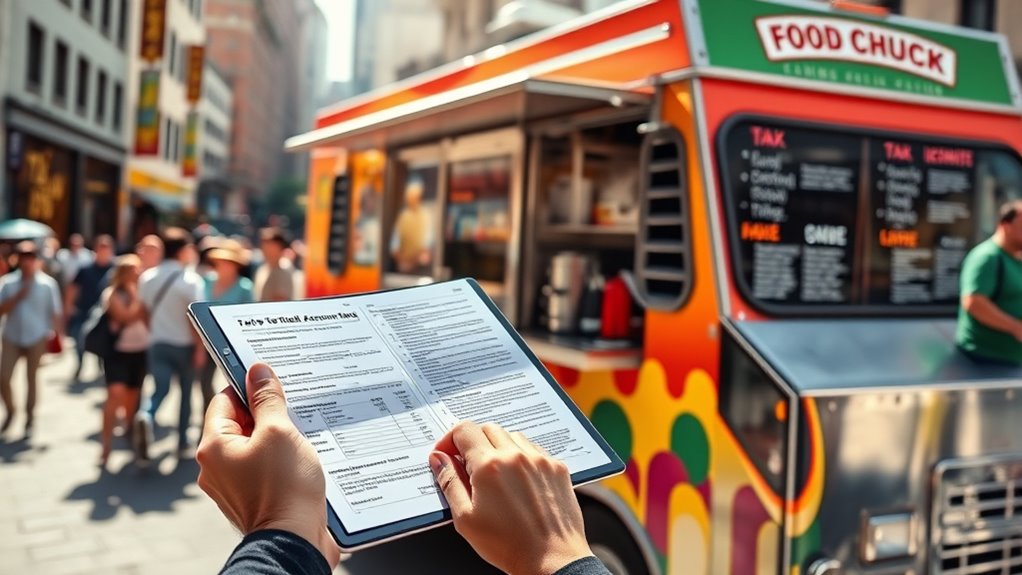To understand food truck taxes and accounting, you need to get the right licenses and permits, like health permits and business licenses, which build trust and legal compliance. You must track your income, expenses, and inventory carefully, including vehicle and supply costs, and stay current on sales tax and payroll taxes. Claim relevant deductions for vehicle use and permits, and set aside funds for taxes. Keep organized records and consult industry experts to stay compliant and maximize savings as you grow.
Key Takeaways
- Track sales, expenses, and inventory meticulously to ensure accurate financial records and tax filings.
- Collect and remit sales tax according to local and state rates for all transactions.
- Deduct vehicle costs, permits, licenses, and supplies to lower taxable income.
- Maintain organized documentation of income, expenses, and payroll for compliance and audit readiness.
- Consult with industry-specific accountants to optimize deductions and ensure adherence to tax laws.
Navigating Business Licenses and Permits for Food Trucks

Getting the right licenses and permits is essential before hitting the streets with your food truck. These legal requirements guarantee your business operates smoothly and avoids costly fines. Start by securing health permits and a business license, which are mandatory in most areas. Proper licensing also helps you build a strong food truck branding presence, making your truck recognizable and trusted. Incorporate customer loyalty programs to encourage repeat business, but remember, these initiatives are effective only if your truck complies with all local regulations. Check with local health departments and city agencies for specific permits related to food handling, parking, and vending. Staying compliant not only keeps you legal but also enhances your reputation and fosters customer trust. Additionally, understanding affiliate disclosure policies can be important if you promote products or services related to your food truck to maintain transparency with your customers.
Understanding State and Local Tax Obligations

Once you’ve secured the necessary licenses and permits, understanding your state and local tax obligations becomes the next essential step in running your food truck smoothly. You’ll need to collect and remit sales tax on your food sales, which varies by jurisdiction. Additionally, payroll taxes are vital if you employ staff, covering federal and state withholding, Social Security, and Medicare. Failing to comply can result in penalties or fines. Be aware of local tax rates and filing deadlines to avoid surprises. It’s also important to register with your state tax agency and stay updated on any changes in tax laws. Properly managing these obligations ensures your business remains compliant and financially healthy. Regularly reviewing tax compliance requirements helps prevent issues and keeps your operations running smoothly.
Managing Income and Expenses With Proper Record-Keeping

Effective record-keeping is essential for managing your food truck’s income and expenses, as it helps you track financial performance and stay prepared for tax time. You should regularly record sales, expenses, and inventory management details to maintain accurate financial data. Use a simple system to track payroll processing costs, ensuring employee wages and taxes are up to date. Organize your records with a clear table like this:
| Income Source | Expenses | Notes |
|---|---|---|
| Daily sales | Food supplies | Inventory updates |
| Catering events | Staff wages | Payroll details |
| Merchandise | Gas and maintenance | Cost tracking |
| Tips | Permits and licenses | Tax deductions |
Consistent documentation will streamline tax filing and help you make informed business decisions. Maintaining financial records diligently also supports better budgeting and planning for future growth.
Tax Deductions and Credits Specific to Mobile Food Businesses

Mobile food businesses can take advantage of various tax deductions and credits that are tailored to their unique operational needs. These include specific incentives like food truck incentives and mobile vendor credits, designed to offset costs and encourage growth. You might qualify for deductions on vehicle expenses, including maintenance, fuel, and insurance. Additionally, you can claim costs related to food supplies, permits, and licensing fees. Some jurisdictions offer tax credits for implementing eco-friendly practices or using energy-efficient equipment. Keep in mind that understanding and leveraging these incentives can substantially reduce your tax liability. Staying informed about available food truck incentives and mobile vendor credits ensures you’re maximizing your benefits and staying compliant with tax laws. Proper planning can make a meaningful difference in your business’s financial health. Being aware of specialized incentives for mobile vendors can help you identify additional savings opportunities.
Best Practices for Financial Planning and Compliance

To guarantee your food truck operates smoothly and remains compliant with tax laws, it’s essential to establish solid financial planning practices. Start by maintaining accurate records of all income and expenses, including food truck insurance costs and marketing strategies. Regularly review your financial statements to identify areas for improvement and ensure you’re meeting tax obligations. Set aside funds for taxes to avoid surprises at year-end. Budget for ongoing expenses like insurance and marketing to support growth and stability. Stay informed about changing tax laws that affect mobile food businesses. Consulting with an accountant familiar with food truck operations can help you navigate compliance and optimize deductions. Additionally, understanding the cost of equipment such as electric bikes and generators can help you better plan your budget and expenses. Proactive planning keeps your business financially healthy and compliant, minimizing risks and maximizing profitability.
Frequently Asked Questions
How Do Food Truck Taxes Differ From Traditional Restaurant Taxes?
Food truck taxes differ from traditional restaurant taxes because you need to consider fleet management and permit compliance. You often pay additional licensing fees for mobile operations and may face different sales tax rates depending on locations. Tracking your sales across various spots is vital, and managing taxes efficiently helps you stay compliant. Unlike brick-and-mortar restaurants, your tax obligations shift with your mobility, so staying organized prevents penalties.
What Are Common Accounting Mistakes Food Truck Owners Should Avoid?
It’s ironic how many food truck owners overlook simple mistakes that could drain profits. You might forget to track inventory management carefully, leading to waste and lost revenue, or neglect payroll accuracy, causing headaches with taxes. These errors seem small but can snowball into serious issues. Keep close tabs on your inventory and double-check payroll details—doing so saves headaches and keeps your business running smoothly.
Which Software Tools Are Best for Food Truck Financial Management?
When choosing software tools for your food truck, look for ones with integrated Point of Sale and Inventory Management features. These tools help you track sales, manage stock levels, and simplify accounting. Popular options like Square and Toast offer user-friendly interfaces and real-time data. Using such software streamlines your operations, reduces errors, and keeps your financial management efficient, so you can focus on serving great food and growing your business.
How Often Should Food Truck Owners Review Their Financial Statements?
You should review your financial statements at least monthly to stay on top of cash flow and inventory management. Regular reviews help you spot cash flow issues early and track inventory levels, preventing shortages or overstocking. By doing this consistently, you can make informed decisions, optimize profits, and guarantee your food truck runs smoothly. Frequent checks keep you proactive, not reactive, to your business’s financial health.
Are There Specific Industry-Specific Tax Incentives for Mobile Food Vendors?
You might wonder if there are industry-specific incentives for mobile vendors. Yes, many regions offer industry-specific incentives that benefit food truck owners, like tax credits or grants aimed at supporting small businesses and mobile vendors. These benefits help reduce your overall tax burden and encourage growth. Making sure you stay informed about local programs can maximize your mobile vendor benefits, helping your food truck thrive financially.
Conclusion
By staying on top of licenses, taxes, and record-keeping, you’ll find that managing your food truck’s finances becomes smoother—almost like a well-timed coincidence. When you keep organized, you’re more likely to catch deductions and credits that can save you money. So, embrace good financial habits, and you might just discover that what once felt overwhelming becomes a natural part of your mobile food journey. After all, smart planning often leads to unexpected success.









